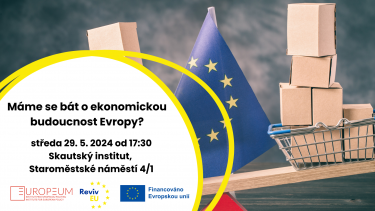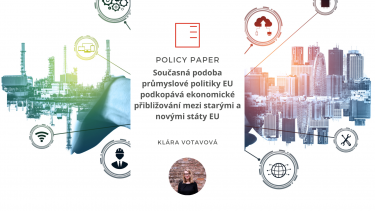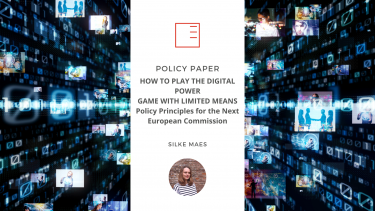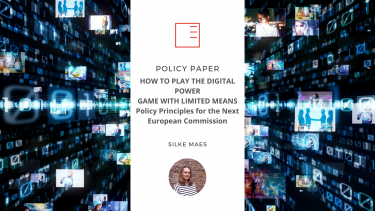Policy Brief | Were Czech industrial policy interests reflected in EU 2024-2029 strategic agenda discussions?
In light of the recent return of industrial policy to the global and EU stage, this policy brief outlines how Czech interests in this policy were reflected in the debates leading up to the adoption of 2024-2029 EU strategic agenda. First, it strives to define Czech industrial policy interests, outlining two alternative approaches to how they can be perceived. The liberal approach follows the long established consensus, according to which Czechia – as a very open, export oriented economy – should promote above all a seamless Single Market and free trade. Writes EUROPEUM Institute researcher Klára Votavová in her Policy Brief.
Show morePolicy Brief | Byly zájmy české průmyslové politiky zahrnuty v diskusích o strategické agendě EU na roky 2024-2029?
V souvislosti s nedávným návratem průmyslové politiky na globální a unijní scénu tento policy brief popisuje, jak se české zájmy v této politice odrážely v debatách vedoucích k přijetí strategické agendy EU na období 2024-2029. Nejprve se snaží definovat zájmy české průmyslové politiky a nastiňuje dva alternativní přístupy k tomu, jak je lze vnímat. Liberální přístup navazuje na dlouhodobě zavedený konsenzus, podle něhož by Česko - jako velmi otevřená, exportně orientovaná ekonomika - mělo prosazovat především bezproblémový vnitřní trh bez překážek a volný obchod. Píše výzkumná pracovnice Institutu EUROPEUM Klára Votavová ve své nové publikaci.
Show moreRevivEU | Should we fear for the economic future of Europe?
We invite you to a public podcast recording focusing on the discussion of the impacts of the COVID-19 pandemic on European industrial policy and its potential consequences for the Czech economy and society. We will discuss the new technological dynamics resulting from the pandemic and explore ways in which the European Union can respond to technological competition with the USA and China.
Show morePolicy paper | Current EU industrial policy undermines economic convergence between old and new EU countries
The post-communist states of Central and Eastern Europe, including the Czech Republic, joined the European Union at the height of globalisation and the dominance of the so-called Washington Consensus policies. However, the global economic crisis of 2008 showed shortly afterwards that these policies had their limits. Read more in Klára Votavová's Policy Pepeu.
Show morePolicy Paper | HOW TO PLAY THE DIGITAL POWER GAME WITH LIMITED MEANS Policy Principles for the Next European Commission
In the global competition for technological dominance, this policy brief sets out six principles for the next Commission on how to play the digital power game with limited resources. Despite the size of its market, the EU lacks common fiscal capacity, capital markets and labour market dynamics. Writes Silke Maes, Research Fellow at EUROPEUM Institute.
Show morePolicy Paper | HOW TO PLAY THE DIGITAL POWER GAME WITH LIMITED MEANS Policy Principles for the Next European Commission
Svět se nachází v horké fázi globální soutěže o nadvládu v nových technologiích. Pokud chce EU zůstat do budoucna konkurenceschopná, musí být více aktivní. Jak na to rozebírá náš nejnovější policy paper z pera výzkumné pracovnice Silke Maes. Navrhuje v něm šest konkrétních kroků pro novou Evropskou komisi vzešlou z voleb do EP v roce 2024.
Show moreREPORT | EU-Pacific Talks | Global Race in Emerging Technologies: Lessons for EU-Pacific Cooperation
In the next debate of the EU-Pacific Talks series, hosted by EUROPEUM Institute for European Policy, the guests explored the relationship between cooperation and competition in overcoming technological frontiers in the context of pressing climate and industrial demands. Guests explored insights on fostering technological innovation, tackling climate change and promoting sustainable development. Read what our guests discussed in the report written by Simona Růžičková.
Show moreEuractiv | Strengthening ammunition production through the new European Defence Industrial Strategy
The new European Defence Industrial Strategy primarily responds to the Ukrainian need for ammunition supplies due to Russian invasion. It includes measures such as support for collective procurement of defense systems, focus on the involvement of European firms in public tenders, support for national budgets in transitioning to new weapon systems, and the development of stronger ties with Ukraine and NATO. Zuzana Krulichová, a researcher specializing in European defense policy at EUROPEUM Institute, commented on the funding of the new strategy for Euractiv.
Show more
Trend.sk: The Union is not giving up on the idea of a green future. Although it will increase prices for housing and travel
Kateřina Davidová, who leads our climate research team, explains to TREND the possible risks of the new European standards. In the interview, she also adds the reasons why the EU insists on its green policy.
Show more
INVITATION | Café Evropa online: Car transport in Europe - how will the new EU legislation affect it?
We would like to invite you to another debate within the Café Evropa series, this time on the topic "Car transport in Europe - how will the new EU legislation affect it?". The debate will take place on Tuesday 2 May at 17:30 online on our Facebook page.
Show moreStaroměstské náměstí 4/1
Prague 1 - Staré Město
110 00
tel.: +420 212 246 552
email: europeum@europeum.org
https://www.europeum.org








